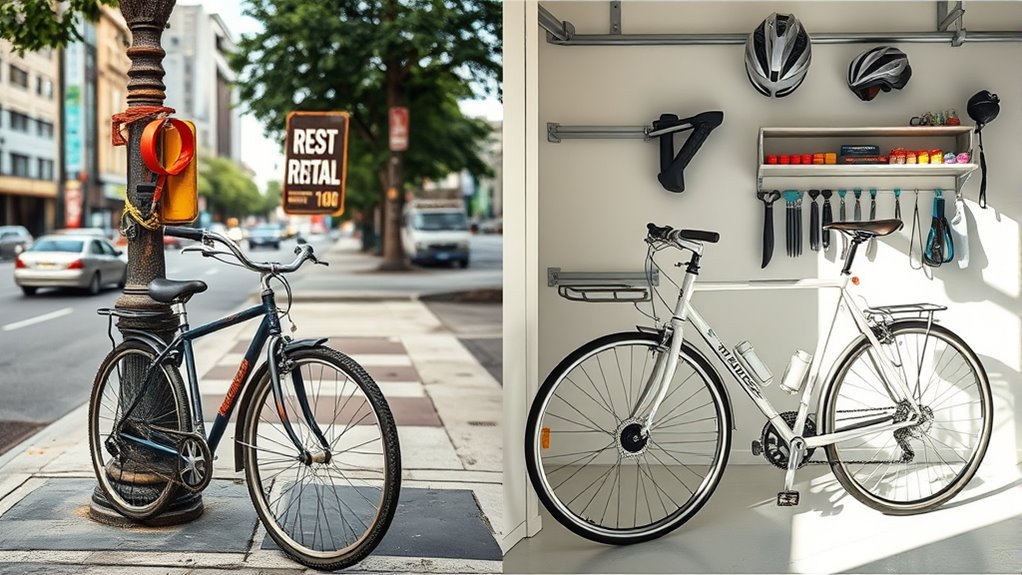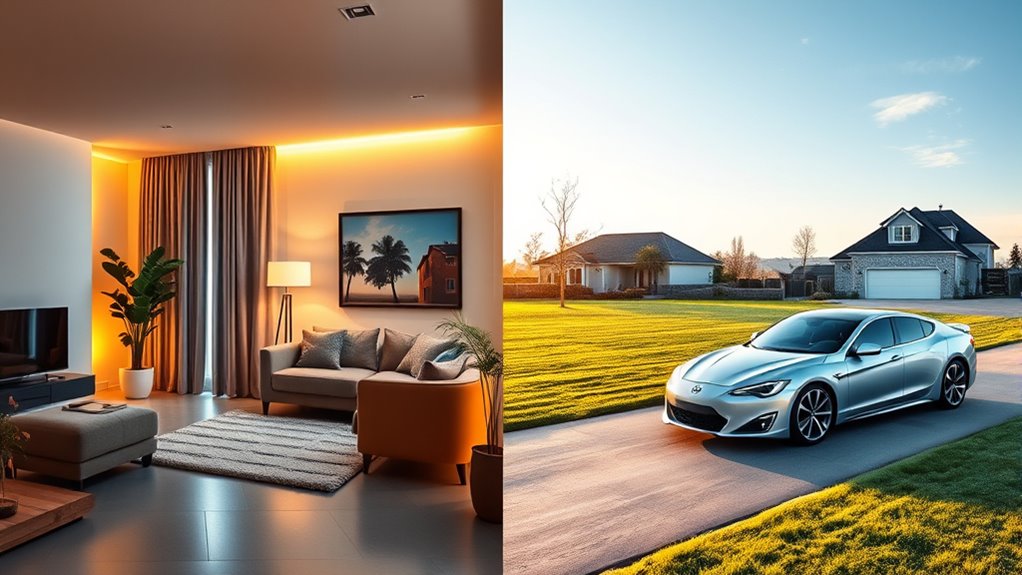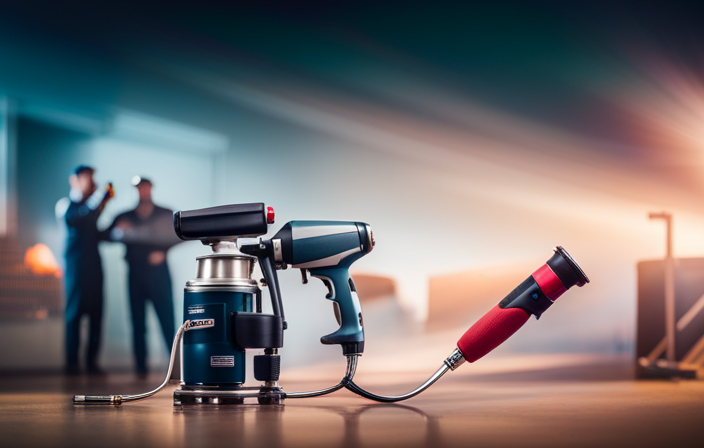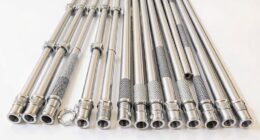When choosing between renting and buying, consider the true costs involved. Renting typically requires less upfront money and covers maintenance, offering flexibility and fewer responsibilities. Buying involves a larger initial investment, ongoing expenses like taxes and repairs, but helps you build equity and wealth over time. Long-term, ownership can be more cost-effective if you stay put. If you’re curious about how these costs compare in detail, there’s more to uncover below.
Key Takeaways
- Renting involves lower upfront costs but does not build equity or long-term wealth.
- Buying requires significant initial investment and ongoing expenses like taxes, insurance, and maintenance.
- Renting offers flexibility and easier relocation without property responsibilities; buying provides stability and investment growth.
- Long-term homeownership can be more cost-effective through equity buildup and property appreciation.
- Total ownership costs include mortgage payments, property taxes, repairs, and opportunity costs of the down payment.

Deciding whether to rent or buy can considerably impact your financial future and lifestyle. When you’re faced with this choice, it’s essential to understand that each option comes with its own set of costs, benefits, and long-term implications. Renting might seem straightforward, offering flexibility and fewer upfront expenses, but buying involves a significant investment and ongoing costs that can build equity over time. Your decision should hinge on your financial situation, personal goals, and how you envision your future.
If you choose to rent, you typically pay a monthly fee that covers your use of the property, often including maintenance and repairs. This arrangement requires less upfront cash, making it accessible if you don’t have a substantial savings pool. Renting also offers flexibility—if your job changes, or you want to explore different neighborhoods, moving is generally easier and less costly. However, rent payments don’t contribute toward ownership; they’re an expense that provides no return, and landlords can increase rent periodically, potentially making your housing costs unpredictable.
On the other hand, buying a home demands a considerable initial investment, including a down payment, closing costs, and other fees. But in return, you build equity—your ownership stake in the property—that can grow as you pay down your mortgage. Over time, property appreciation can boost your wealth, and mortgage payments often stay stable if you lock in a fixed rate. Homeownership also gives you the freedom to customize your space and avoid the restrictions often found in rentals. Still, owning a home involves ongoing costs such as property taxes, homeowners insurance, maintenance, and repairs. These expenses can add up quickly and may be less predictable than rent.
You should also consider your long-term plans. If you intend to stay put for several years, buying might be more cost-effective and a good way to build wealth. Conversely, if your circumstances are uncertain—like a job that might require relocation or a desire for more flexibility—renting might serve you better. Additionally, the true cost of ownership isn’t just the monthly payment; it’s the total of all associated expenses and the opportunity cost of your down payment.
Moreover, understanding the concept of protective styling benefits can help you appreciate how certain homeownership choices can serve as protective measures for your financial stability over time.
Ultimately, your choice hinges on your financial health, lifestyle preferences, and future goals. Both renting and buying have their merits, but understanding their true costs helps you make an informed decision tailored to your unique situation.
Frequently Asked Questions
How Does Maintenance Differ Between Renting and Owning?
When renting, maintenance is typically handled by your landlord, so you’re not responsible for repairs or upkeep costs. In contrast, owning means you’re responsible for all maintenance, from small repairs to major upgrades. This can save you money in the long run if you’re handy, but it also requires time, effort, and budgeting for unexpected expenses. Your choice depends on how much effort and responsibility you’re willing to take on.
Are There Tax Benefits for Homeowners Versus Renters?
Yes, as a homeowner, you can benefit from tax advantages like deducting mortgage interest and property taxes, which can lower your taxable income. Renters usually don’t get these deductions but may qualify for renter’s credits in some states. Owning a home often offers potential tax savings, but it also involves responsibilities and costs. You should consult a tax professional to understand how these benefits apply to your specific situation.
What Is the Impact on Credit Scores When Buying or Renting?
Credit counts can climb or crumble based on your buying or renting choices. When you buy, making timely payments boosts your credit score, showing lenders you’re dependable. Renting, on the other hand, can also help if you consistently pay on time, but it may not impact your score as strongly. So, stay consistent with payments, and you’ll strengthen your credit, supporting your financial future whichever path you choose.
How Do Insurance Costs Compare for Renters and Homeowners?
Your insurance costs tend to be higher for homeowners because they need a all-encompassing policy that covers the structure, belongings, and liability. Renters usually pay for a renter’s insurance policy, which is less expensive since it only covers personal belongings and liability. As a homeowner, you’ll likely face higher premiums due to the increased coverage needed, while renters benefit from more affordable rates focused solely on their personal property.
What Are the Long-Term Financial Implications of Renting Versus Buying?
If you rent, you avoid hefty upfront costs and property taxes, but you won’t build equity. Buying requires a significant initial investment, but over time, your mortgage payments help you own an asset that could appreciate. In the long run, buying can offer financial stability and potential growth, while renting might give you flexibility and fewer maintenance costs. Your choice depends on your financial goals and lifestyle.
Conclusion
Think of renting and buying like sailing a boat: renting is like riding a swift, carefree breeze—you enjoy the journey without the weight of ownership. Buying is like steering your own vessel, facing rough waters but gaining full control. Both paths have their storms and calm. Ultimately, you choose which voyage suits your course. Remember, whether you’re on a breeze or a steady ship, the horizon’s yours—your decision sets the sail.









